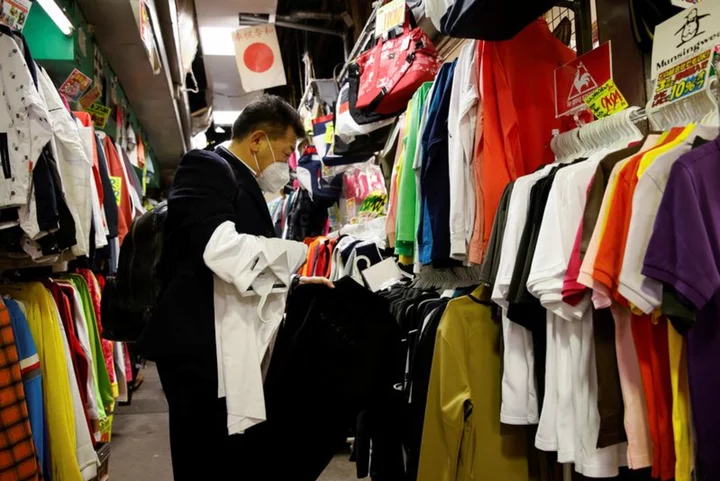By Leika Kihara and Takahiko Wada
TOKYO (Reuters) -Japan's core inflation in September slowed below the 3% threshold for the first time in over a year but stayed above the central bank target, keeping alive expectations that policymakers will phase out ultra-easy monetary policy.
The data will be among a host of indicators the Bank of Japan (BOJ) will scrutinise at its two-day policy meeting ending on Oct. 31, when it produces fresh quarterly growth and price forecasts.
"While inflation weakened in September, we think inflation will only fall below the BoJ's 2% target by the end of next year," said Marcel Thieliant, head of Asia-Pacific at Capital Economics.
The core consumer price index (CPI), which excludes volatile fresh food costs, rose 2.8% in September from a year earlier, government data showed on Friday, slightly exceeding a median market forecast for a 2.7% gain but easing from 3.1% in August.
Utility bills fell reflecting the lagged effect of past oil price falls, helping inflation slow below 3% for the first time since August 2022, the data showed.
Prices of food and daily necessities continued to rise but at a slower pace than in August, a sign that cost-push pressures were easing.
The core-core index, which strips away fresh food and fuel costs and is closely watched by the BOJ as a better gauge of trend inflation, rose 4.2% in September from a year earlier, slowing from a 4.3% gain in August.
While inflation will likely moderate in coming months, a renewed spike in oil costs and persistent yen falls could prod firms to raise prices again, said Shinke Yoshiki, chief economist at Dai-ichi Life Research Institute.
"There's strong uncertainty on the expected pace of declines in inflation," he said, adding that core inflation may not fall below 2% until the latter half of 2024.
Markets are rife with speculation the BOJ will soon end negative short-term interest rates and yield curve control, which sets a 0% cap for the 10-year bond yield, in response to broadening inflationary pressure.
The BOJ has played down the near-term chance of phasing out its massive stimulus, arguing the recent cost-driven price rises need to change into demand-driven increases in inflation for the bank to consider hiking interest rates.
An upgrade to its inflation forecasts alone won't prod the BOJ to phase out stimulus as policymakers are focusing more on whether wages will rise enough to underpin consumption, said two sources familiar with its thinking.
There are growing signs consumers are feeling the pinch from rising prices as inflation-adjusted real wages keep falling.
In a quarterly meeting on Thursday, some BOJ regional branch managers said consumers are becoming more sensitive to price hikes and buying less items at supermarkets.
A government survey on taxi drivers, restaurants and other service-sector firms showed their sentiment souring in September, highlighting the fragile nature of consumption.
While firms offered wage increases unseen in three decades this year, the key for policymakers is whether the trend continues next year and spreads to smaller firms across regions, analysts say.
A Reuters poll showed core consumer inflation in Japan's capital Tokyo, seen as a leading indicator of nationwide figures, will likely hit 2.5% in October, steady from the previous month. The Tokyo CPI data is due out Oct. 27.
(Reporting by Leika Kihara and Takahiko Wada; Editing by Muralikumar Anantharaman and Shri Navaratnam)

